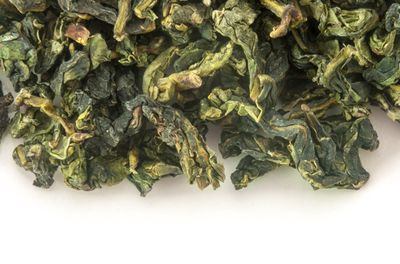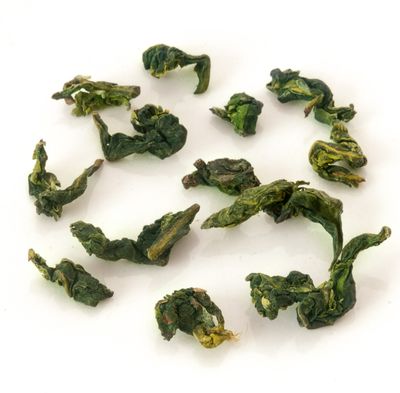Difference between revisions of "Tie Guan Yin"
| (5 intermediate revisions by the same user not shown) | |||
| Line 1: | Line 1: | ||
| − | [[File:Tie-Guan-Yin-close.jpg | + | [[File:Tie-Guan-Yin-close.jpg|thumbnail|right|Tie Guan Yin close]] |
| − | [[File:20090606 Putuoshan 8786.jpg|thumb | + | [[File:20090606 Putuoshan 8786.jpg|thumb|right|Statue of Guan Yin at Mount Putuo, Zhejiang, China]] |
| − | [[File:Tie-Guan-Yin.jpg|thumb | + | [[File:Tie-Guan-Yin.jpg|thumb|Tie Guan Yin]] |
| − | + | '''Tie Guan Yin''' (铁观音) is a premium variety of Chinese [[oolong|oolong tea]] originated in the 19th century in Anxi in Fujian province. Tie Guan Yin produced in different areas of Anxi have different gastronomic characteristics. Production has since extended to many regions even outside of China, including Taiwan. | |
==Etymology== | ==Etymology== | ||
| − | The tea is named after the Chinese Goddess of Mercy | + | The tea is named after the Chinese Goddess of Mercy Guan Yin, who is known in Japan as Kannon and in Korea as Guam-eum. Guan Yin is a female embodiment of Avalokiteśvara Bodhisattva. |
| − | The name of the Chinese tea is translated in English as "Iron | + | The name of the Chinese tea is translated in English as "Iron Guan Yin", and sometimes as "Iron Goddess of Mercy". These two names are accurate. The deity has long been given a female identity in Chinese folk culture, although the original Chinese name carries no suggestion of the male-or-female-nature. A more accurate translation of the reference to the deity should be (the One) Observing the Voice of the People. |
Other spellings and names include "Ti Kuan Yin," "Tit Kwun Yum," "Ti Kwan Yin," "Iron Buddha," "Iron Goddess Oolong," and "Tea of the Iron Bodhisattva." It is also known in the abbreviated form as "TGY." | Other spellings and names include "Ti Kuan Yin," "Tit Kwun Yum," "Ti Kwan Yin," "Iron Buddha," "Iron Goddess Oolong," and "Tea of the Iron Bodhisattva." It is also known in the abbreviated form as "TGY." | ||
| Line 15: | Line 15: | ||
==Varieties== | ==Varieties== | ||
By roasting level: | By roasting level: | ||
| − | * ''Jade Tie | + | * ''Jade Tie Guan Yin'' (lightly baked Tie Guan Yin) is a newer type of Tie Guan Yin and has a light green jade color. It produces a very flowery aroma and taste. It is more similar to green tea than Oolong. |
| − | * ''Thoroughly Baked Tie | + | * ''Thoroughly Baked Tie Guan Yin'' is the original style. It has a more complex taste profile and warm aroma, but the traditional baking technique has not been passed on well so quality ones of this style is less seen in the market than "moderately baked' and "lightly" baked versions. |
| − | * ''Moderately baked Tie | + | * ''Moderately baked Tie Guan Yin'' is a new breed that some argue has a good balance of floral aroma and complex taste, but it stores poorly. |
By harvest time: | By harvest time: | ||
| − | * ''Spring Tie | + | * ''Spring Tie Guan Yin'' is harvested around Li Xia (Start of Summer) and has the best overall quality. |
| − | * ''Autumn Tie | + | * ''Autumn Tie Guan Yin'' is harvested in the autumn and has strong aroma but less complex taste. |
| − | * ''Summer Tie | + | * ''Summer Tie Guan Yin'' is harvested in summer and is considered lower quality. Summer Tie Guan Yin can be further divided into two types one harvested in June to July, one harvested in August. |
| − | * ''Winter Tie | + | * ''Winter Tie Guan Yin'' is harvested in winter. Production of Winter Tie Guan Yin is very low. |
Other categories: | Other categories: | ||
| − | * '' | + | * ''Guan Yin Wang'' (Guan Yin "King") is the best of Jade Tie Guan Yin and Autumn Tie Guan Yin. |
==Types== | ==Types== | ||
| − | Based on the different roasting methods and locations, the types of Tie | + | Based on the different roasting methods and locations, the types of Tie Guan Yin are various. |
| − | *The Anxi Iron Goddess Tea 安溪鉄観音- This oolong is typically close to a [[green tea]], with only a little [[Oxidation | + | *The Anxi Iron Goddess Tea 安溪鉄観音- This oolong is typically close to a [[green tea]], with only a little [[Oxidation|oxidation]] and only light roasted. With a very flowery and fresh delicate aroma character, the tea liquor is golden yellow. |
*The Muzha Iron Goddess Tea 木柵鉄観音- This traditional oolong is strong roasted and has therefor a stronger taste with roast nutty character. The tea liquor is reddish-brown. | *The Muzha Iron Goddess Tea 木柵鉄観音- This traditional oolong is strong roasted and has therefor a stronger taste with roast nutty character. The tea liquor is reddish-brown. | ||
| Line 36: | Line 36: | ||
* [[Oolong]] | * [[Oolong]] | ||
* [[China Famous Tea]] | * [[China Famous Tea]] | ||
| − | |||
[[Category:China famous tea]] | [[Category:China famous tea]] | ||
| Line 42: | Line 41: | ||
[[Category:Chinese tea]] | [[Category:Chinese tea]] | ||
| + | [[de:Tie Guan Yin]] | ||
| + | |||
| + | {{#seo: | ||
| + | |title=Tie Guan Yin - Teapedia | ||
| + | |title_mode=append | ||
| + | |keywords=Tie Guan Yin, anxi tea, oolong | ||
| + | |description=Tie Guan Yin is a premium variety of Chinese oolong tea originated in the 19th century in Anxi in Fujian province. | ||
| + | |image=http://teapedia.org/en/File:Tie-Guan-Yin-close.jpg | ||
| + | |image_alt=Tie Guan Yin tea | ||
| + | |||
| + | |og:site_name=Teapedia - The Tea Encyclopedia | ||
| + | |og:title=Tie Guan Yin - Teapedia | ||
| + | |og:description=Tie Guan Yin is a premium variety of Chinese oolong tea originated in the 19th century in Anxi in Fujian province. | ||
| + | |og:image=http://teapedia.org/en/File:Tie-Guan-Yin-close.jpg | ||
| + | |article:publisher=445826108840166 | ||
| − | + | |twitter:card=summary | |
| + | |twitter:title=Tie Guan Yin - Teapedia | ||
| + | |twitter:site=@TeapediaOrg | ||
| + | |twitter:image:src=http://teapedia.org/en/File:Tie-Guan-Yin-close.jpg | ||
| + | }} | ||
Latest revision as of 10:27, 13 April 2020
Tie Guan Yin (铁观音) is a premium variety of Chinese oolong tea originated in the 19th century in Anxi in Fujian province. Tie Guan Yin produced in different areas of Anxi have different gastronomic characteristics. Production has since extended to many regions even outside of China, including Taiwan.
Etymology
The tea is named after the Chinese Goddess of Mercy Guan Yin, who is known in Japan as Kannon and in Korea as Guam-eum. Guan Yin is a female embodiment of Avalokiteśvara Bodhisattva.
The name of the Chinese tea is translated in English as "Iron Guan Yin", and sometimes as "Iron Goddess of Mercy". These two names are accurate. The deity has long been given a female identity in Chinese folk culture, although the original Chinese name carries no suggestion of the male-or-female-nature. A more accurate translation of the reference to the deity should be (the One) Observing the Voice of the People.
Other spellings and names include "Ti Kuan Yin," "Tit Kwun Yum," "Ti Kwan Yin," "Iron Buddha," "Iron Goddess Oolong," and "Tea of the Iron Bodhisattva." It is also known in the abbreviated form as "TGY."
Varieties
By roasting level:
- Jade Tie Guan Yin (lightly baked Tie Guan Yin) is a newer type of Tie Guan Yin and has a light green jade color. It produces a very flowery aroma and taste. It is more similar to green tea than Oolong.
- Thoroughly Baked Tie Guan Yin is the original style. It has a more complex taste profile and warm aroma, but the traditional baking technique has not been passed on well so quality ones of this style is less seen in the market than "moderately baked' and "lightly" baked versions.
- Moderately baked Tie Guan Yin is a new breed that some argue has a good balance of floral aroma and complex taste, but it stores poorly.
By harvest time:
- Spring Tie Guan Yin is harvested around Li Xia (Start of Summer) and has the best overall quality.
- Autumn Tie Guan Yin is harvested in the autumn and has strong aroma but less complex taste.
- Summer Tie Guan Yin is harvested in summer and is considered lower quality. Summer Tie Guan Yin can be further divided into two types one harvested in June to July, one harvested in August.
- Winter Tie Guan Yin is harvested in winter. Production of Winter Tie Guan Yin is very low.
Other categories:
- Guan Yin Wang (Guan Yin "King") is the best of Jade Tie Guan Yin and Autumn Tie Guan Yin.
Types
Based on the different roasting methods and locations, the types of Tie Guan Yin are various.
- The Anxi Iron Goddess Tea 安溪鉄観音- This oolong is typically close to a green tea, with only a little oxidation and only light roasted. With a very flowery and fresh delicate aroma character, the tea liquor is golden yellow.
- The Muzha Iron Goddess Tea 木柵鉄観音- This traditional oolong is strong roasted and has therefor a stronger taste with roast nutty character. The tea liquor is reddish-brown.


